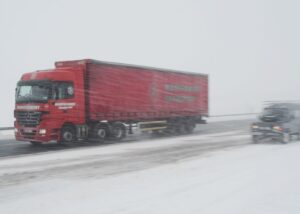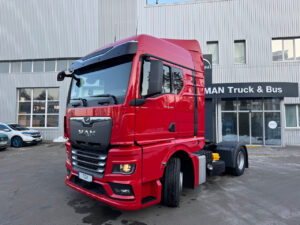
The passage of trucks with cargo through the checkpoints on the Polish border “Medika” (in Ukraine, the checkpoint “Shegini”), “Khrebenne” (in Ukraine, “Rava-Ruska”) has been suspended, and at the ‘Korchova’ checkpoint (in Ukraine, “Krakovets”), it has been slowed down, the State Border Service reported on its Telegram channel on Sunday.
“According to information from the Polish side, the database used to process freight vehicles leaving Ukraine (entering the Republic of Poland) has been temporarily suspended at the Medyka and Hrebenne border crossing points. At the Korczowa checkpoint, the Polish customs service database is operating at a slower pace,” the border guards said in a statement.
Empty freight vehicles are being processed as usual. Other types of transport are undergoing border and customs procedures without any changes.
“According to preliminary information, the Polish customs database is expected to resume full operation by 10 p.m. (Ukrainian time) on January 18, 2026,” the State Border Service said in a statement.

Traffic restrictions for trucks and large vehicles have been introduced on state roads in the Vinnytsia region due to significant weather deterioration, according to the State Agency for Restoration Telegram.
“Restrictions are being imposed … on the following road sections: M-30 Stryi — Uman — Dnipro — Izvarine (via Vinnytsia, Kropyvnytskyi) km 441 — km 417 (from Nemyriv, Vinnytsia region to the border of Cherkasy region); R-33 Vinnytsia — Turbov — Haysyn — Balta — Velyka Mykhailivka — /M-16/ — km 121 — km 170 (from Haysyn to Obodivka village, Haysyn district, Vinnytsia region),” the information says.
The agency reminded that similar measures are in place in Volyn, Zhytomyr, Rivne, and Lviv regions, and this is extremely important to prevent traffic jams, accidents, and congestion at the borders of neighboring regions.
“The resumption of vehicle traffic will be announced separately,” the agency said.

Sales of new commercial vehicles (trucks and special vehicles) in Ukraine in November 2025 decreased by 10% compared to the same month in 2024, to 982 units, which is also 18% less than in October 2025, according to UkrAvtoprom on its Telegram channel.
The leader in this market in November was MAN with sales of 118 vehicles, which ranked fourth in November last year and October this year (89 and 90 units, respectively), followed by last year’s leader Renault with 117 units. (233 units last year), and FIAT came in third with 88 units, which ranked 11th last November with 42 vehicles.
Next in the ranking are Citroen with 85 units (in November 2024, it was in second place with 143 cars) and Mercedes-Benz with 79 units (last year, it had 100 cars and was in third place).
According to UkrAvtoprom, a total of 10,835 new vehicles were added to the Ukrainian fleet of trucks and special-purpose vehicles in January-November, which is 6% less than in the same period last year.
As reported, in 2024, according to UkrAvtoprom, 12,900 new commercial vehicles were registered in Ukraine, which is 14% more than in 2023.

Imports of trucks to Ukraine in January-October 2025 increased by 8% in monetary terms compared to the same period in 2024, reaching $819.5 million, according to statistics from the State Customs Service.
According to the published data, the growth rate of imports of this type of vehicle has slowed down again, reaching 11.6% in the first 10 months compared to the same period in 2024.
In October, truck imports fell by 17% compared to October 2024, to $79.2 million, which is also a quarter less than in September 2025.
The largest number of trucks in 10 months was imported from Poland – $149.6 million (1.3% less than last year), France – $133.2 million (43.3% more) and the United States – $104.2 million (30.4% more).
Imports from all other countries in January-October decreased slightly, amounting to $432.6 million.
At the same time, according to statistics, Ukraine exported only $5.6 million worth of trucks in 10 months, mainly to Turkey (62.4% of exports), Romania (32.4%), and Moldova, while a year earlier, exports were even more insignificant ($2.8 million), mainly to Moldova, Poland, and Kazakhstan.
As reported, in 2024, imports of trucks to Ukraine in monetary terms increased by 30% compared to 2023, to $947.84 million, with most of them imported from Poland (almost 20%).

In January-April 2025, truck imports to Ukraine decreased by 4.3% in monetary terms compared to the same period in 2024, to $286.56 million, according to statistics from the State Customs Service (SCS).
According to the published data of the SCS, in April, imports of this type of vehicle decreased by 12.2% compared to April 2024, to $71.31 million.
The largest number of trucks in four months was imported from the US – $64.09 million (22.4% of imports), Poland – $61.77 million (21.2%), and France – $46.03 million (16%).
A year ago, the top three truck suppliers were Poland (23.2% of total truck imports, or $69 million), the US (11%, or $33.4 million), and China (10.1%, or $30.2 million).
Imports from all other countries in January-April decreased by 30.6% to $115.7 million.
At the same time, according to statistics, Ukraine exported only $2.73 million worth of trucks in four months, mainly to Romania (57.3% of exports of such vehicles), Turkey, and Moldova, while a year earlier, exports were even more insignificant ($1 million).
As reported, in 2024, imports of trucks to Ukraine in monetary terms increased by 30% compared to 2023, to $947.84 million, with the largest share coming from Poland (almost 20%).

Imports of trucks to Ukraine in January-March 2025 decreased by 1.3% in monetary terms compared to the same period in 2024, to $215.15 million, according to statistics from the State Customs Service.
According to the published data of the State Customs Service, in particular, in March, imports of these vehicles decreased by almost 13% compared to March 2024 – to $69.62 million.
As reported, in January of this year, truck imports decreased by 6% compared to January-2024, and in February, an increase of 21% was recorded compared to February last year.
Most trucks were imported in the first quarter from the United States – $50.06 million (23.3% of imports), Poland – $47.25 million (22.15%) and France – $35.27 million (16.4%).
A year ago, the top three truck-supplying countries were Poland (23.2% of total truck imports or $50.6 million), China (10.7% or $23.4 million) and France (10.3% or $22.4 million).
Imports from all other countries decreased by 32.4% to $82.2 million in January-March.
At the same time, according to statistics, Ukraine exported only $2.5 million worth of trucks in three months, mostly to Romania (59.4% of truck exports), Turkey (38%), and Moldova (2%), while a year earlier there were insignificant exports ($0.5 million).
As reported, in 2024, imports of trucks to Ukraine in monetary terms increased by 30% compared to 2023 – up to $947.84 million, most of them were imported from Poland (almost 20%).